高中英语外研版必修三 Unit 6 Disaster And Hope (3)课件(55张ppt)
文档属性
| 名称 | 高中英语外研版必修三 Unit 6 Disaster And Hope (3)课件(55张ppt) |
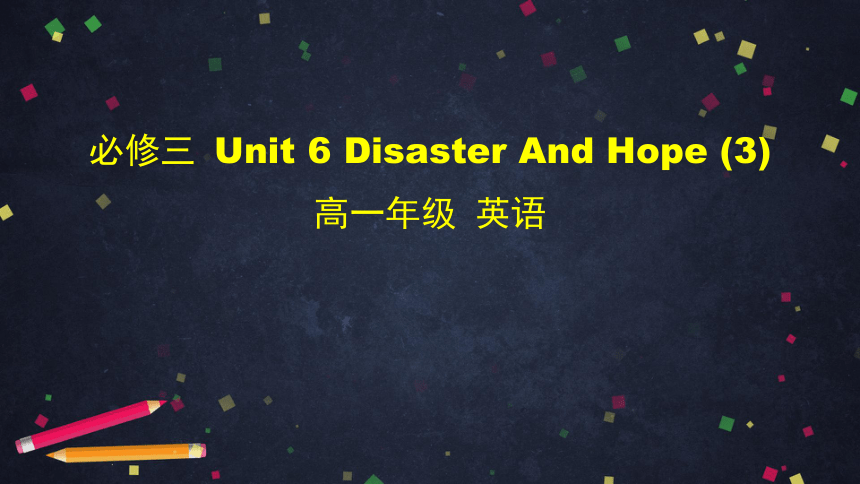
|
|
| 格式 | zip | ||
| 文件大小 | 1.9MB | ||
| 资源类型 | 教案 | ||
| 版本资源 | 外研版(2019) | ||
| 科目 | 英语 | ||
| 更新时间 | 2020-06-28 00:00:00 | ||
图片预览

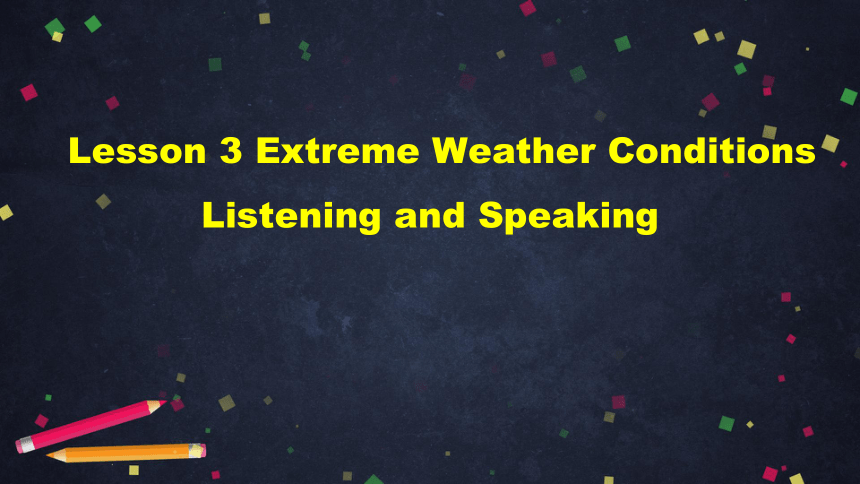
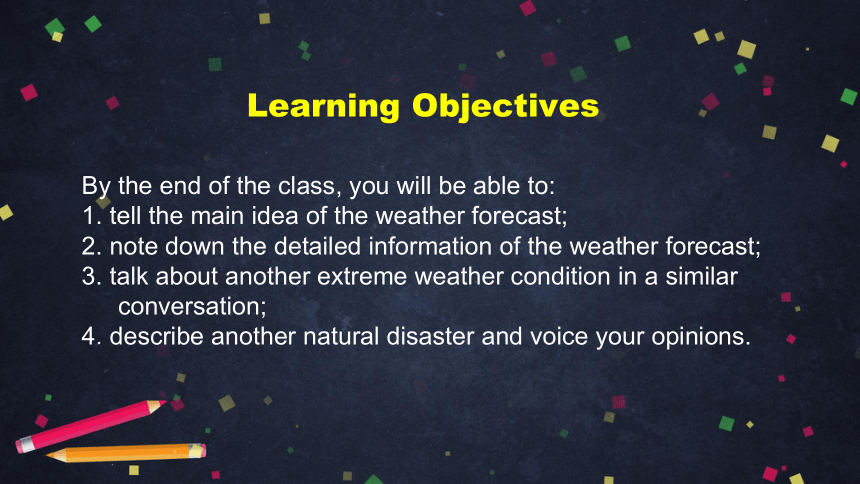
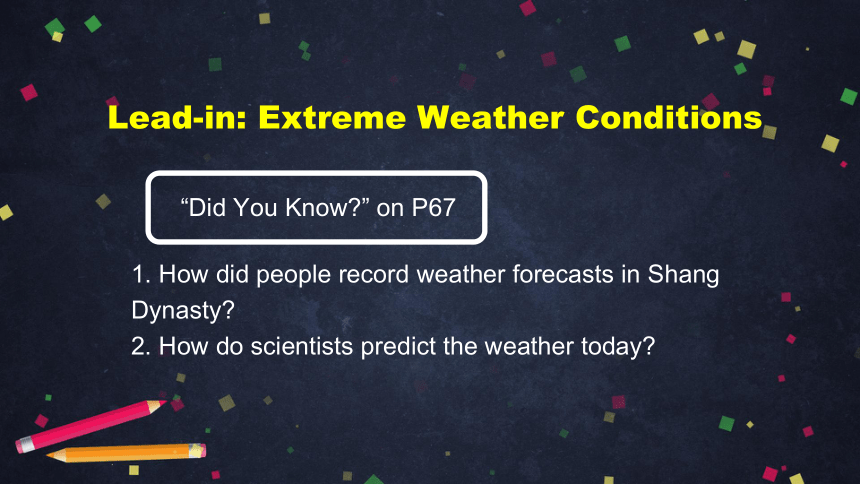
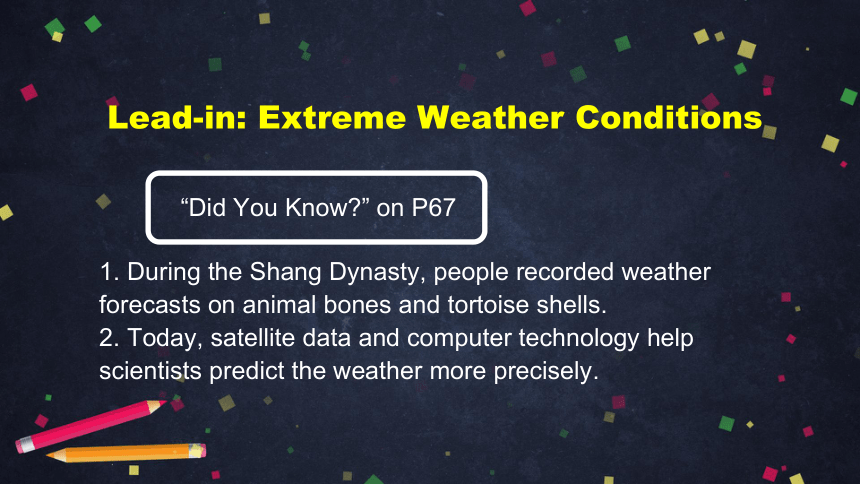
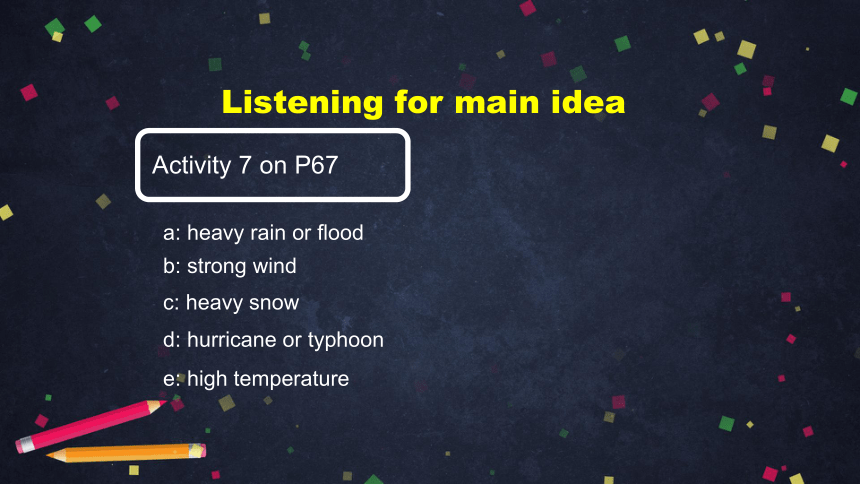
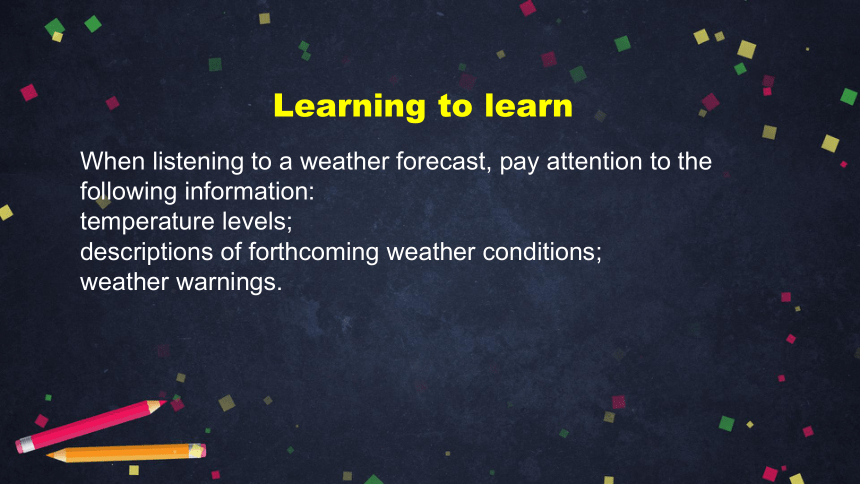
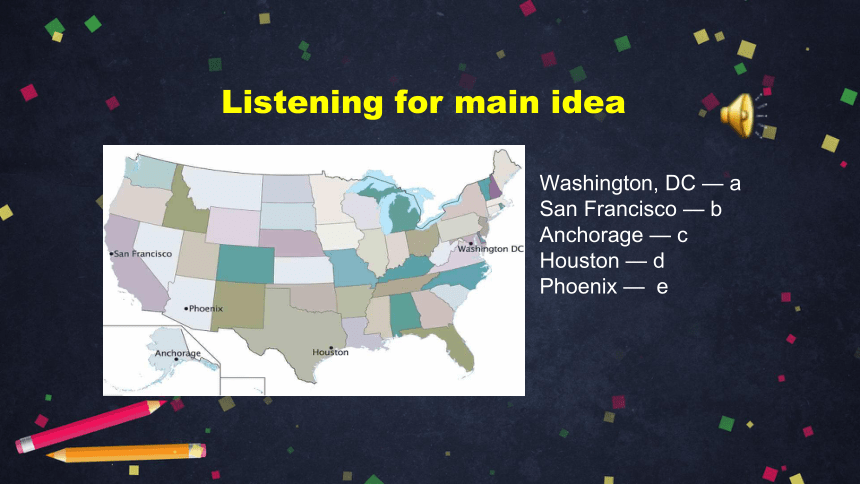

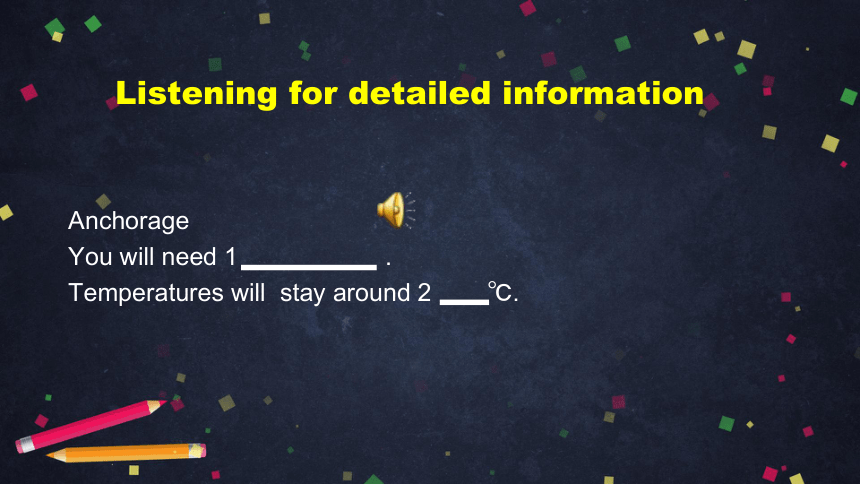
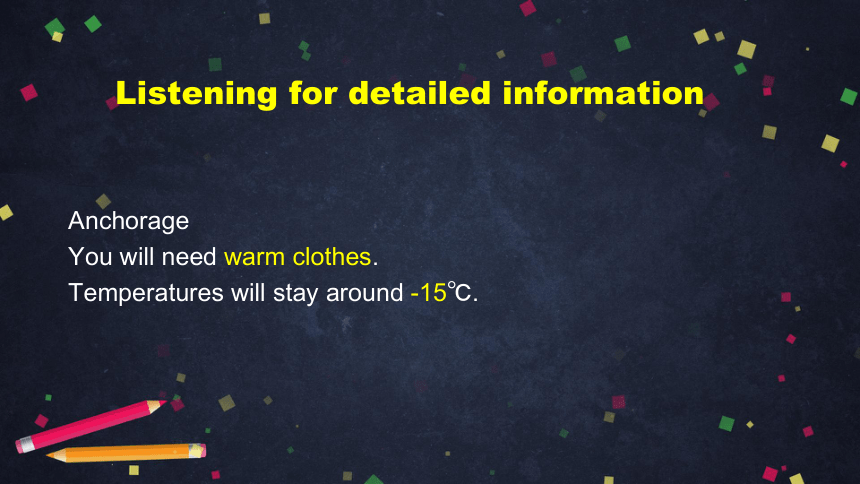
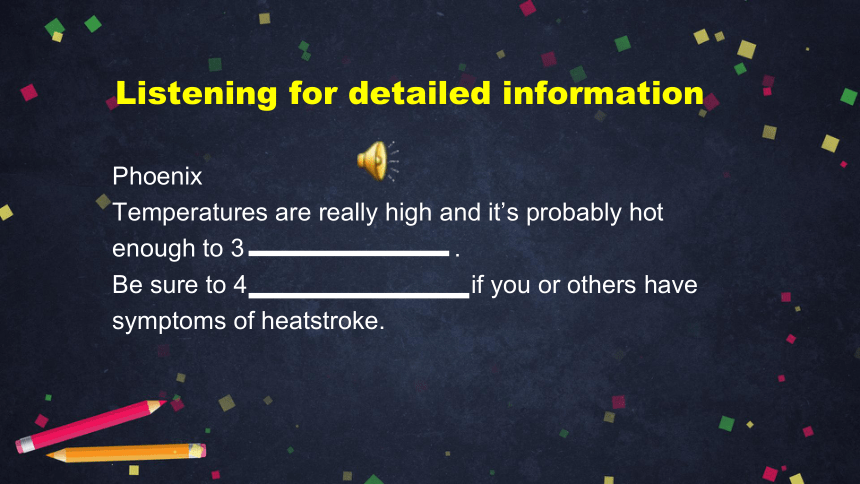
文档简介
(共55张PPT)
必修三
Unit
6
Disaster
And
Hope
(3)
高一年级
英语
Lesson
3
Extreme
Weather
Conditions
Listening
and
Speaking
Learning
Objectives
By
the
end
of
the
class,
you
will
be
able
to:
1.
tell
the
main
idea
of
the
weather
forecast;
2.
note
down
the
detailed
information
of
the
weather
forecast;
3.
talk
about
another
extreme
weather
condition
in
a
similar
conversation;
4.
describe
another
natural
disaster
and
voice
your
opinions.
1.
How
did
people
record
weather
forecasts
in
Shang
Dynasty?
2.
How
do
scientists
predict
the
weather
today?
Lead-in:
Extreme
Weather
Conditions
“Did
You
Know?”
on
P67
1.
During
the
Shang
Dynasty,
people
recorded
weather
forecasts
on
animal
bones
and
tortoise
shells.
2.
Today,
satellite
data
and
computer
technology
help
scientists
predict
the
weather
more
precisely.
“Did
You
Know?”
on
P67
Lead-in:
Extreme
Weather
Conditions
b:
strong
wind
Activity
7
on
P67
c:
heavy
snow
d:
hurricane
or
typhoon
e:
high
temperature
a:
heavy
rain
or
flood
Listening
for
main
idea
Learning
to
learn
When
listening
to
a
weather
forecast,
pay
attention
to
the
following
information:
temperature
levels;
descriptions
of
forthcoming
weather
conditions;
weather
warnings.
Washington,
DC
—
a
San
Francisco
—
b
Anchorage
—
c
Houston
—
d
Phoenix
—
e
Listening
for
main
idea
Activity
8
on
P67
Listening
for
detailed
information
Anchorage
You
will
need
1
.
Temperatures
will
stay
around
2
℃.
Listening
for
detailed
information
Listening
for
detailed
information
Anchorage
You
will
need
warm
clothes.
Temperatures
will
stay
around
-15℃.
Phoenix
Temperatures
are
really
high
and
it’s
probably
hot
enough
to
3
.
Be
sure
to
4
if
you
or
others
have
symptoms
of
heatstroke.
Listening
for
detailed
information
Phoenix
Temperatures
are
really
high
and
it’s
probably
hot
enough
to
fry
meat
on
the
road.
Be
sure
to
get
medical
attention
if
you
or
others
have
symptoms
of
heatstroke.
Listening
for
detailed
information
Houston
It’s
5
season
and
there
will
be
a
big
one
across
the
Atlantic.
Stay
6
and
listen
out
for
the
latest
forecasts.
Listening
for
detailed
information
Houston
It’s
hurricane
season
and
there
will
be
a
big
one
across
the
Atlantic.
Stay
safe
indoors
and
listen
out
for
the
latest
forecasts.
Listening
for
detailed
information
Washington,
DC
Temperatures
are
going
to
stay
around
7
℃.
Don’t
drive
8
!
Listening
for
detailed
information
Washington,
DC
Temperatures
are
going
to
stay
around
13℃.
Don’t
drive
through
floodwaters!
Listening
for
detailed
information
San
Francisco
Temperatures
are
going
to
be
around
9
℃.
People
are
suffering
from
10
,
which
are
causing
damage
and
loss.
Listening
for
detailed
information
San
Francisco
Temperatures
are
going
to
be
around
25℃.
People
are
suffering
from
wildfires,
which
are
causing
damage
and
loss.
Listening
for
detailed
information
Listening
for
speaking
Now
listen
to
the
weather
forecast
again
and
take
notes
on
the
expressions
used
to
describe
the
weather.
Good
morning
USA,
and
welcome
to
today’s
weather
report
for
Monday
April
3.
As
we
all
know,
this
year,
2080
has
so
far
had
a
lot
of
extreme
weather.
Get
ready
for
a
lot
more!
First
let’s
look
at
Anchorage,
where
there
is
some
unusually
cold
weather
for
this
time
of
year.
Be
sure
to
wear
warm
clothes
—
you’re
going
to
need
them
if
you
do
have
to
go
outside!
We’re
going
to
see
some
heavy
snow
over
the
next
week,
with
temperatures
staying
around
-15
degrees.
Listening
for
speaking
In
contrast
to
Anchorage,
residents
of
Phoenix
are
going
to
experience
another
kind
of
extreme
weather.
They
are
about
to
be
hit
by
temperatures
of
up
to…
wow,
52
degrees!
That’s
probably
hot
enough
to
fry
meat
on
the
road!
Seriously,
though,
drink
lots
of
water
and
try
to
stay
cool.
Be
sure
to
get
medical
attention
if
you
or
others
have
symptoms
of
heatstroke.
Listening
for
speaking
In
Houston,
temperatures
will
stay
around
30
degrees.
We
all
know
that
this
time
of
year
is
hurricane
season
near
the
Gulf
of
Mexico,
and
there
is
a
big
one
coming
our
way
across
the
Atlantic.
Be
sure
to
stay
safe
indoors
and
listen
out
for
the
latest
forecasts.
Listening
for
speaking
Temperatures
are
going
to
stay
around
13
degrees
in
Washington,
DC.
But
there
is
yet
more
rain
expected.
That’s
14
days
of
rain
in
a
row
for
the
city.
Some
advice
for
everyone
there
—
do
not
try
to
drive
through
floodwaters!
And
if
you
must
drive
in
the
rain,
drive
slowly
and
steadily.
Listening
for
speaking
In
San
Francisco,
temperatures
will
be
moderate
around
25
degrees.
However,
this
is
combined
with
the
dry
California
climate
and
a
strong
wind
force
of
8.
This
is
not
good
news
at
all
for
the
firefighters
trying
to
control
the
wildfires
outside
the
city.
We
are
all
thinking
about
people
there
who
have
lost
their
homes
and
belongings.
If
you
want
to
help,
please
listen
for
details
about
how
to
make
a
donation
after
this
report.
Listening
for
speaking
Speaking
Activity
9
Work
in
pairs
and
act
out
the
conversation
to
talk
about
an
extreme
weather
condition
by
referring
to
clues
on
page
83
and
86.
Useful
expressions
to
talk
about
extreme
weather
conditions.
I’m
calling
to
check
that…
How
long
have…
lasted?
What’s
the
effect
of…?
How
do
you
cope
with…?
Is
there
anything
I
can
do
to…?
How
has
the
weather
changed…?
Speaking
Useful
expressions
to
talk
about
extreme
weather
conditions.
Thank
you
for…
The…
have
lasted…
The
most
serious
effect
is…
Be
sure
to…
I’d
really
appreciate
it
if
you
would…
There
have
been
more…
Speaking
Student
A
You
learn
from
a
TV
report
that
Student
B’s
city
has
been
suffering
from
rainstorms
and
floods.
Call
student
B
to
check
if
he
/
she
is
safe
and
ask
about
the
weather.
Speaking
Information
you’d
like
to
know:
how
long
the
rainstorms
have
lasted;
the
effect
of
the
rainstorms
on
his
/
her
city;
how
to
cope
during
rainstorms
and
floods;
what
you
can
do
to
help;
how
the
weather
has
changed
over
recent
years.
Speaking
Student
B
Your
city
has
been
suffering
from
rainstorms
and
floods.
Student
A
calls
you
to
check
you
are
safe
and
ask
about
the
weather.
Give
him
/
her
the
information.
Duration:
about
five
days;
Effect:
no
electricity;
shortage
of
food
and
drinking
water;
damage
to
property.
Speaking
Points
for
attention:
stay
away
from
fallen
power
lines,
particularly
in
or
near
water;
move
to
higher
ground,
away
from
the
flow
of
water.
Things
to
help:
make
a
donation;
volunteer
to
help
people
in
need;
share
knowledge
on
how
to
prevent
disease.
Changes
to
the
weather:
more
frequent
extreme
weather
conditions;
more
severe
rainstorms
and
floods.
Speaking
Sample
Student
A:
Hello.
It’s
reported
that
your
city
has
been
suffering
from
rainstorms
and
floods.
I’m
calling
to
check
that
you
are
safe.
Student
B:
I
am
safe.
Thank
you
for
your
concern.
Student
A:
How
long
have
the
rainstorms
lasted?
Student
B:
The
rainstorms
have
lasted
for
about
five
days.
Student
A:
What’s
the
effect
of
the
rainstorms
on
your
city?
Student
B:
The
rainstorms
have
caused
plenty
of
effects
on
our
life,
such
as
no
electricity,
shortage
of
food
and
drinking
water
and
so
on.
Among
them,
the
most
serious
effect
is
that
it
has
caused
great
damage
to
our
property.
Sample
Student
A:
How
do
you
cope
with
rainstorms
and
floods?
Student
B:
There
are
many
points
for
attention.
Above
all,
be
sure
to
stay
away
from
fallen
power
lines,
particularly
in
or
near
water.
Besides,
you
should
move
to
higher
ground
and
stay
away
from
the
flow
of
water.
Sample
Student
A:
Is
there
anything
I
can
do
to
help?
Student
B:
I’d
really
appreciate
it
if
you
would
make
a
donation,
or
volunteer
to
help
people
in
need
or
share
knowledge
on
how
to
prevent
disease.
Sample
Sample
Student
A:
How
has
the
weather
changed
over
the
recent
years?
Student
B:
Over
the
recent
years,
there
have
been
more
frequent
extreme
weather
conditions
and
more
severe
rainstorms
and
floods.
Student
A:
Yes.
So
we
need
to
pay
more
attention
to
the
weather
forecast.
Please
take
care
of
yourself
and
send
my
regards
to
your
family.
Student
B:
You
too.
Thank
you.
Bye
bye.
Student
A:
Bye.
Sample
Criteria
Pronunciation
and
intonation
30’
Language
(useful
expressions)
30’
Content
40’
Overall
performance
100’
Score
comment
Speaking
drought
typhoon
blizzard
tsunami
Speaking
wildfire
avalanche
Speaking
earthquake
Speaking
Answering
the
questions
1.
Which
one
do
you
think
is
the
most
dangerous?
2.
Can
you
name
some
big
natural
disasters
in
history?
1.
I
think
earthquake
is
the
most
dangerous
because
it
can
cause
great
damage
to
human
beings.
2.
Some
natural
disasters
in
history
including:
the
1976
Tangshan
earthquake;
the
8.1-magnitude
earthquake
hit
Nepal
in
2015;
the
Indian
Ocean
Tsunami
in
2004…
Answering
the
questions
Completing
the
reports
Complete
the
reports
with
the
words
in
Activity
4.
Pay
attention
to
the
words
describing
natural
disasters.
Completing
the
reports
In
1881,
a
typhoon
struck
the
small
Vietnamese
city
of
Haiphong,
bringing
terrible
strong
winds.
When
it
hit
the
coast,
huge
tidal
waves
caused
severe
flood,
costing
the
lives
of
up
to
300,000
citizens.
In
August
1949,
the
Landes
region
of
South-west
France
faced
a
major
wildfire
that
lasted
almost
a
week.
Some
500
km2
of
forested
land
was
burnt
and
82
people
killed.
Even
today,
it
is
considered
one
of
Europe’s
most
deadly
forest
fires.
Completing
the
reports
The
winter
of
1950
to
1951
came
to
be
known
as
the
Winter
of
Terror
over
600
avalanche
struck
towns
and
villages
in
the
mountains
of
the
Swiss-Austrian
Alps.
Caused
by
exceptionally
heavy
snowball
within
a
short
period
of
time,
they
destroyed
buildings
and
forests,
and
claimed
over
256
lives.
Completing
the
reports
In
1960,
Chile
suffered
the
strongest
earthquake
to
be
recorded
in
the
20th
century.
The
shock
is
generally
agreed
to
have
had
a
magnitude
of
9.5.
It
caused
a
tsunami
with
waves
of
up
to
25
meters
affecting
places
as
far
as
Hawaii
and
Japan.
Completing
the
reports
A
blizzard
hit
Iran
in
February
1972,
causing
a
week
of
extremely
low
temperatures.
Winter
storms
brought
as
much
as
7.9
meters
of
snow
in
the
south
of
the
country,
resulting
in
the
deaths
of
about
4,000
people.
Completing
the
reports
In
July
2011,
a
drought
struck
East
Africa.
It
was
said
to
be
worst
in
60
years,
and
not
a
single
drop
of
rain
fell
for
almost
a
whole
year.
It
led
to
a
severe
food
crisis
and
threatened
the
livelihoods
of
more
than
9.5
million
people.
Completing
the
reports
Focusing
on
the
words
describing
natural
disasters
Summary
We
have
learned:
1.
some
background
information
about
the
development
of
the
weather
forecast;
2.
some
detailed
information
of
the
weather
forecast;
3.
expressions
used
to
describe
the
weather
condition;
4.
words
and
expressions
describing
natural
disasters.
Homework
Option
1:
Write
a
similar
conversation
to
talk
about
another
extreme
weather
condition,
using
what
you
have
learnt
in
this
session.
Option
2:
Talk
about
a
recent
natural
disaster
you
have
heard
about
or
seen
on
the
news
and
voice
your
opinion.
必修三
Unit
6
Disaster
And
Hope
(3)
高一年级
英语
Lesson
3
Extreme
Weather
Conditions
Listening
and
Speaking
Learning
Objectives
By
the
end
of
the
class,
you
will
be
able
to:
1.
tell
the
main
idea
of
the
weather
forecast;
2.
note
down
the
detailed
information
of
the
weather
forecast;
3.
talk
about
another
extreme
weather
condition
in
a
similar
conversation;
4.
describe
another
natural
disaster
and
voice
your
opinions.
1.
How
did
people
record
weather
forecasts
in
Shang
Dynasty?
2.
How
do
scientists
predict
the
weather
today?
Lead-in:
Extreme
Weather
Conditions
“Did
You
Know?”
on
P67
1.
During
the
Shang
Dynasty,
people
recorded
weather
forecasts
on
animal
bones
and
tortoise
shells.
2.
Today,
satellite
data
and
computer
technology
help
scientists
predict
the
weather
more
precisely.
“Did
You
Know?”
on
P67
Lead-in:
Extreme
Weather
Conditions
b:
strong
wind
Activity
7
on
P67
c:
heavy
snow
d:
hurricane
or
typhoon
e:
high
temperature
a:
heavy
rain
or
flood
Listening
for
main
idea
Learning
to
learn
When
listening
to
a
weather
forecast,
pay
attention
to
the
following
information:
temperature
levels;
descriptions
of
forthcoming
weather
conditions;
weather
warnings.
Washington,
DC
—
a
San
Francisco
—
b
Anchorage
—
c
Houston
—
d
Phoenix
—
e
Listening
for
main
idea
Activity
8
on
P67
Listening
for
detailed
information
Anchorage
You
will
need
1
.
Temperatures
will
stay
around
2
℃.
Listening
for
detailed
information
Listening
for
detailed
information
Anchorage
You
will
need
warm
clothes.
Temperatures
will
stay
around
-15℃.
Phoenix
Temperatures
are
really
high
and
it’s
probably
hot
enough
to
3
.
Be
sure
to
4
if
you
or
others
have
symptoms
of
heatstroke.
Listening
for
detailed
information
Phoenix
Temperatures
are
really
high
and
it’s
probably
hot
enough
to
fry
meat
on
the
road.
Be
sure
to
get
medical
attention
if
you
or
others
have
symptoms
of
heatstroke.
Listening
for
detailed
information
Houston
It’s
5
season
and
there
will
be
a
big
one
across
the
Atlantic.
Stay
6
and
listen
out
for
the
latest
forecasts.
Listening
for
detailed
information
Houston
It’s
hurricane
season
and
there
will
be
a
big
one
across
the
Atlantic.
Stay
safe
indoors
and
listen
out
for
the
latest
forecasts.
Listening
for
detailed
information
Washington,
DC
Temperatures
are
going
to
stay
around
7
℃.
Don’t
drive
8
!
Listening
for
detailed
information
Washington,
DC
Temperatures
are
going
to
stay
around
13℃.
Don’t
drive
through
floodwaters!
Listening
for
detailed
information
San
Francisco
Temperatures
are
going
to
be
around
9
℃.
People
are
suffering
from
10
,
which
are
causing
damage
and
loss.
Listening
for
detailed
information
San
Francisco
Temperatures
are
going
to
be
around
25℃.
People
are
suffering
from
wildfires,
which
are
causing
damage
and
loss.
Listening
for
detailed
information
Listening
for
speaking
Now
listen
to
the
weather
forecast
again
and
take
notes
on
the
expressions
used
to
describe
the
weather.
Good
morning
USA,
and
welcome
to
today’s
weather
report
for
Monday
April
3.
As
we
all
know,
this
year,
2080
has
so
far
had
a
lot
of
extreme
weather.
Get
ready
for
a
lot
more!
First
let’s
look
at
Anchorage,
where
there
is
some
unusually
cold
weather
for
this
time
of
year.
Be
sure
to
wear
warm
clothes
—
you’re
going
to
need
them
if
you
do
have
to
go
outside!
We’re
going
to
see
some
heavy
snow
over
the
next
week,
with
temperatures
staying
around
-15
degrees.
Listening
for
speaking
In
contrast
to
Anchorage,
residents
of
Phoenix
are
going
to
experience
another
kind
of
extreme
weather.
They
are
about
to
be
hit
by
temperatures
of
up
to…
wow,
52
degrees!
That’s
probably
hot
enough
to
fry
meat
on
the
road!
Seriously,
though,
drink
lots
of
water
and
try
to
stay
cool.
Be
sure
to
get
medical
attention
if
you
or
others
have
symptoms
of
heatstroke.
Listening
for
speaking
In
Houston,
temperatures
will
stay
around
30
degrees.
We
all
know
that
this
time
of
year
is
hurricane
season
near
the
Gulf
of
Mexico,
and
there
is
a
big
one
coming
our
way
across
the
Atlantic.
Be
sure
to
stay
safe
indoors
and
listen
out
for
the
latest
forecasts.
Listening
for
speaking
Temperatures
are
going
to
stay
around
13
degrees
in
Washington,
DC.
But
there
is
yet
more
rain
expected.
That’s
14
days
of
rain
in
a
row
for
the
city.
Some
advice
for
everyone
there
—
do
not
try
to
drive
through
floodwaters!
And
if
you
must
drive
in
the
rain,
drive
slowly
and
steadily.
Listening
for
speaking
In
San
Francisco,
temperatures
will
be
moderate
around
25
degrees.
However,
this
is
combined
with
the
dry
California
climate
and
a
strong
wind
force
of
8.
This
is
not
good
news
at
all
for
the
firefighters
trying
to
control
the
wildfires
outside
the
city.
We
are
all
thinking
about
people
there
who
have
lost
their
homes
and
belongings.
If
you
want
to
help,
please
listen
for
details
about
how
to
make
a
donation
after
this
report.
Listening
for
speaking
Speaking
Activity
9
Work
in
pairs
and
act
out
the
conversation
to
talk
about
an
extreme
weather
condition
by
referring
to
clues
on
page
83
and
86.
Useful
expressions
to
talk
about
extreme
weather
conditions.
I’m
calling
to
check
that…
How
long
have…
lasted?
What’s
the
effect
of…?
How
do
you
cope
with…?
Is
there
anything
I
can
do
to…?
How
has
the
weather
changed…?
Speaking
Useful
expressions
to
talk
about
extreme
weather
conditions.
Thank
you
for…
The…
have
lasted…
The
most
serious
effect
is…
Be
sure
to…
I’d
really
appreciate
it
if
you
would…
There
have
been
more…
Speaking
Student
A
You
learn
from
a
TV
report
that
Student
B’s
city
has
been
suffering
from
rainstorms
and
floods.
Call
student
B
to
check
if
he
/
she
is
safe
and
ask
about
the
weather.
Speaking
Information
you’d
like
to
know:
how
long
the
rainstorms
have
lasted;
the
effect
of
the
rainstorms
on
his
/
her
city;
how
to
cope
during
rainstorms
and
floods;
what
you
can
do
to
help;
how
the
weather
has
changed
over
recent
years.
Speaking
Student
B
Your
city
has
been
suffering
from
rainstorms
and
floods.
Student
A
calls
you
to
check
you
are
safe
and
ask
about
the
weather.
Give
him
/
her
the
information.
Duration:
about
five
days;
Effect:
no
electricity;
shortage
of
food
and
drinking
water;
damage
to
property.
Speaking
Points
for
attention:
stay
away
from
fallen
power
lines,
particularly
in
or
near
water;
move
to
higher
ground,
away
from
the
flow
of
water.
Things
to
help:
make
a
donation;
volunteer
to
help
people
in
need;
share
knowledge
on
how
to
prevent
disease.
Changes
to
the
weather:
more
frequent
extreme
weather
conditions;
more
severe
rainstorms
and
floods.
Speaking
Sample
Student
A:
Hello.
It’s
reported
that
your
city
has
been
suffering
from
rainstorms
and
floods.
I’m
calling
to
check
that
you
are
safe.
Student
B:
I
am
safe.
Thank
you
for
your
concern.
Student
A:
How
long
have
the
rainstorms
lasted?
Student
B:
The
rainstorms
have
lasted
for
about
five
days.
Student
A:
What’s
the
effect
of
the
rainstorms
on
your
city?
Student
B:
The
rainstorms
have
caused
plenty
of
effects
on
our
life,
such
as
no
electricity,
shortage
of
food
and
drinking
water
and
so
on.
Among
them,
the
most
serious
effect
is
that
it
has
caused
great
damage
to
our
property.
Sample
Student
A:
How
do
you
cope
with
rainstorms
and
floods?
Student
B:
There
are
many
points
for
attention.
Above
all,
be
sure
to
stay
away
from
fallen
power
lines,
particularly
in
or
near
water.
Besides,
you
should
move
to
higher
ground
and
stay
away
from
the
flow
of
water.
Sample
Student
A:
Is
there
anything
I
can
do
to
help?
Student
B:
I’d
really
appreciate
it
if
you
would
make
a
donation,
or
volunteer
to
help
people
in
need
or
share
knowledge
on
how
to
prevent
disease.
Sample
Sample
Student
A:
How
has
the
weather
changed
over
the
recent
years?
Student
B:
Over
the
recent
years,
there
have
been
more
frequent
extreme
weather
conditions
and
more
severe
rainstorms
and
floods.
Student
A:
Yes.
So
we
need
to
pay
more
attention
to
the
weather
forecast.
Please
take
care
of
yourself
and
send
my
regards
to
your
family.
Student
B:
You
too.
Thank
you.
Bye
bye.
Student
A:
Bye.
Sample
Criteria
Pronunciation
and
intonation
30’
Language
(useful
expressions)
30’
Content
40’
Overall
performance
100’
Score
comment
Speaking
drought
typhoon
blizzard
tsunami
Speaking
wildfire
avalanche
Speaking
earthquake
Speaking
Answering
the
questions
1.
Which
one
do
you
think
is
the
most
dangerous?
2.
Can
you
name
some
big
natural
disasters
in
history?
1.
I
think
earthquake
is
the
most
dangerous
because
it
can
cause
great
damage
to
human
beings.
2.
Some
natural
disasters
in
history
including:
the
1976
Tangshan
earthquake;
the
8.1-magnitude
earthquake
hit
Nepal
in
2015;
the
Indian
Ocean
Tsunami
in
2004…
Answering
the
questions
Completing
the
reports
Complete
the
reports
with
the
words
in
Activity
4.
Pay
attention
to
the
words
describing
natural
disasters.
Completing
the
reports
In
1881,
a
typhoon
struck
the
small
Vietnamese
city
of
Haiphong,
bringing
terrible
strong
winds.
When
it
hit
the
coast,
huge
tidal
waves
caused
severe
flood,
costing
the
lives
of
up
to
300,000
citizens.
In
August
1949,
the
Landes
region
of
South-west
France
faced
a
major
wildfire
that
lasted
almost
a
week.
Some
500
km2
of
forested
land
was
burnt
and
82
people
killed.
Even
today,
it
is
considered
one
of
Europe’s
most
deadly
forest
fires.
Completing
the
reports
The
winter
of
1950
to
1951
came
to
be
known
as
the
Winter
of
Terror
over
600
avalanche
struck
towns
and
villages
in
the
mountains
of
the
Swiss-Austrian
Alps.
Caused
by
exceptionally
heavy
snowball
within
a
short
period
of
time,
they
destroyed
buildings
and
forests,
and
claimed
over
256
lives.
Completing
the
reports
In
1960,
Chile
suffered
the
strongest
earthquake
to
be
recorded
in
the
20th
century.
The
shock
is
generally
agreed
to
have
had
a
magnitude
of
9.5.
It
caused
a
tsunami
with
waves
of
up
to
25
meters
affecting
places
as
far
as
Hawaii
and
Japan.
Completing
the
reports
A
blizzard
hit
Iran
in
February
1972,
causing
a
week
of
extremely
low
temperatures.
Winter
storms
brought
as
much
as
7.9
meters
of
snow
in
the
south
of
the
country,
resulting
in
the
deaths
of
about
4,000
people.
Completing
the
reports
In
July
2011,
a
drought
struck
East
Africa.
It
was
said
to
be
worst
in
60
years,
and
not
a
single
drop
of
rain
fell
for
almost
a
whole
year.
It
led
to
a
severe
food
crisis
and
threatened
the
livelihoods
of
more
than
9.5
million
people.
Completing
the
reports
Focusing
on
the
words
describing
natural
disasters
Summary
We
have
learned:
1.
some
background
information
about
the
development
of
the
weather
forecast;
2.
some
detailed
information
of
the
weather
forecast;
3.
expressions
used
to
describe
the
weather
condition;
4.
words
and
expressions
describing
natural
disasters.
Homework
Option
1:
Write
a
similar
conversation
to
talk
about
another
extreme
weather
condition,
using
what
you
have
learnt
in
this
session.
Option
2:
Talk
about
a
recent
natural
disaster
you
have
heard
about
or
seen
on
the
news
and
voice
your
opinion.
